- Home
- R. A. Spratt
The Adventures of Nanny Piggins
The Adventures of Nanny Piggins Read online
Table of Contents
About the Author
Title Page
Copyright Page
Dedication
CHAPTER 1
CHAPTER 2
CHAPTER 3
CHAPTER 4
CHAPTER 5
CHAPTER 6
CHAPTER 7
CHAPTER 8
CHAPTER 9
CHAPTER 10
CHAPTER 11
CHAPTER 12
Nanny Piggins and the Wicked Plan
You are about to read a wonderful book. Nanny Piggins is the most amazing pig ever. It has been a privilege to write about her. But before you begin I must (because the publisher has forced me) give you one small warning . . .
Unless you are a pig,
do not copy Nanny Piggins' diet
IN ANY WAY.
You see, pigs and humans have very different bodies. Pigs are a different shape for a start (mainly because they eat so much). Plus, Nanny Piggins is an elite athlete so she has a freakishly fast metabolism that can burn a lot of calories.
So please, for the good of your own health, do not try to eat like Nanny Piggins. There is no doubt that chocolate, cake, biscuits, tarts, chocolate milk, sticky cream buns, lollies, ice-cream, lollipops, sherbet lemons and choc-chip pancakes are all delicious but that does not mean you should eat them seven or eight times a day.
Also, you really must eat vegetables, no matter what Nanny Piggins might say to the contrary, or you will get sick.
Yours sincerely,
R. A. Spratt, the author
The Adventures of
Nanny Piggins
R. A. Spratt
All rights reserved. No part of this book may be reproduced or transmitted by any person or entity, including internet search engines or retailers, in any form or by any means, electronic or mechanical, including printing, photocopying (except under the statutory exceptions provisions of the Australian Copyright Act 1968), recording, scanning or by any information storage and retrieval system without the prior written permission of Random House Australia. Any unauthorised distribution or use of this text may be a direct infringement of the author's and publisher's rights and those responsible may be liable in law accordingly.
The Adventures of Nanny Piggins
ePub ISBN 9781864714210
Kindle ISBN 9781864716481
Original Print Edition
A Random House book
Published by Random House Australia Pty Ltd
Level 3, 100 Pacific Highway, North Sydney NSW 2060
www.randomhouse.com.au
First published by Random House Australia in 2009
Copyright © R. A. Spratt 2009
The moral right of the author has been asserted.
All rights reserved. No part of this book may be reproduced or transmitted by any person or entity, including internet search engines or retailers, in any form or by any means, electronic or mechanical, including photocopying (except under the statutory exceptions provisions of the Australian Copyright Act 1968), recording, scanning or by any information storage and retrieval system without the prior written permission of Random House Australia.
Addresses for companies within the Random House Group can be found at
www.randomhouse.com.au/offices
National Library of Australia
Cataloguing-in-Publication Entry
Author: Spratt, R. A.
Title: The adventures of Nanny Piggins
ISBN: 9781741663167
Series: Spratt, R. A. Nanny Piggins; 1.
Target Audience: For primary school age
Dewey Number: A823.4
Cover illustration by Gypsy Taylor
Cover design, internal design and internal illustrations by Jobi Murphy
Typeset in Adobe Garamond by Midland Typesetters, Australia
Printed and bound by Griffin Press, South Australia
To Angus
CHAPTER 1
Nanny Piggins
and her Dramatic Entrance
Mr Green desperately needed to find a new nanny for his children. In the four weeks since their last nanny left, he found himself actually having to talk to them, provide them with meals and pay attention to them himself. And all this just had to stop. He had a job at a law firm helping rich people avoid paying their taxes. He could not be expected to look after his children as well.
The reason Mrs Green did not look after the children was because she was not there. Mr Green said she had died in a boating accident. But the children were not entirely sure this was true. Yes, there had been a funeral. Yes, there had been an obituary in the paper. But people on television programs died all the time and that never stopped them from coming back in the next series. So they had not totally given up hope that their mother had just got fed up with their father, which was a sentiment they could fully understand.
There were three Green children. The eldest, Derrick, was a fit boy of eleven. He was always sun-tanned or muddy. Either way, he always looked brown. And he always had long messy hair but never went to the barber because the only time his father ever spoke to him was to yell, 'Go and get your hair cut! You look like a scruffbag!'
The second child, Samantha, was a girl. And, as such, had even fewer conversations with her father than Derrick. She was a nice girl and pretty enough, but not so much so as to cause a fuss. Her chief characteristic was that she worried all the time. To be fair, she did have a lot to worry about. Girls whose mothers have drowned in boating accidents would be foolish not to worry.
The third child, Michael, was only seven but, in many ways, he was the most confident. He could not remember his mother at all. So he was not saddened or worried about her loss. Derrick and Samantha bore the brunt of having to deal with Mr Green. So Michael was able to get on with his life unhindered. As a result he was a little on the tubby side. Because Michael's favourite hobby was stealing food from the kitchen, then sitting and eating it under a bush in the garden.
On the whole they were three well-mannered, largely self-sufficient children. And they would have been a doddle for anyone to take care of. Mr Green should have found a nanny in half a second flat. But there was a problem. Not only did Mr Green believe that rich people should not pay taxes. He also believed that he, personally, should not have to pay for anything. He begrudged giving money to a nanny. In his opinion child care should be entirely government provided. Paid for out of the taxes his clients never paid.
But even more than that, Mr Green deeply resented the idea that he had to pay to advertise for a nanny. There was so much unemployment in the world that, in his opinion, nannies should be beating down his door. So despite the fact that he desperately wanted a nanny, he did not have one because he was too cheap to put an advertisement in a newspaper. All Mr Green had done was paint a sign himself with the words NANNY WANTED ? ENQUIRE WITHIN, attach it to a stake and bang it into the front lawn. So far the sign had sat there for three weeks without a single knock at the door.
And now the pressure was really on. One of the neighbours, having watched Michael sitting under a bush eating frozen pizza (that was still frozen), had reported this to the government. And a social worker had arrived to inspect all three children. She then made an appointment to see Mr Green (because he was, of course, at work when she visited) and threatened him. She told him that if he continued to leave his children unattended for ten or twelve hours at a time, they would be taken away and put into government care.
Now Mr Green would have liked nothing more than to have his children taken away. If that happened, then he would not have to go home at all. He could spend all his time at the office, happily reading tax laws, without giving his offspri
ng a second thought. But Mr Green knew that if his children were taken away from him it would look very bad indeed. (People did not think much of him as it was, what with him being a tax lawyer, and him not paying attention when his wife fell offthe boat.) It would damage him professionally if the story got in the papers.
So it is at this point that our story begins – Mr Green was so desperate to hire a nanny that he was actually considering paying to advertise, when this painful thought was interrupted by a loud knock at the front door.
It was a dark and stormy night. Rain was teeming down. As Mr Green opened the door he could not clearly see the person in front of him, silhouetted by the streetlight. But he could tell from the shape that the person was wearing a dress. So he assumed it was a woman. And he assumed she must have come about the position of nanny. Mr Green was flooded with relief. 'Come in, come in,' he beckoned.
As the new nanny stepped into the house, the light hit her and Mr Green could see her clearly for the first time. She wore a simple blue dress with a drop waist and jaunty little jacket. And she was only 4 foot tall. But Mr Green soon forgot about her lack of height when he saw that she had a much more shocking feature. The woman was not a woman. She was a pig. A common, pink, farm pig. The type bacon came from.
'Good evening, I am Nanny Piggins,' said Nanny Piggins the pig.
'Huh?' said Mr Green.
'I have come to apply for the position of nanny,' she explained.
'Well . . .' spluttered Mr Green, buying time as his mind raced, and he tried to figure out what to do, 'Well, um, that's very good. But um . . . I wonder if you're quite suitable, you see.'
'I can start immediately,' said Nanny Piggins.
'Oh,' said Mr Green, he could not deny this would be convenient.
'I have no criminal record,' said Nanny Piggins.
'That is good,' said Mr Green, he could not deny this would please the social worker.
'But I expect to be paid properly,' stated Nanny Piggins.
'Now that might be a difficulty,' interrupted Mr Green. Here he saw he had the perfect excuse for not hiring the pig.
'I charge ten cents an hour,' Nanny Piggins declared boldly.
'You're hired!' exclaimed Mr Green without even thinking. He knew a bargain when he heard one. 'I'll be frank, Nanny Piggins, I would prefer not to have a pig take care of my children. But I am prepared to offer you the job until a suitable human nanny presents herself.'
'Very well,' said Nanny Piggins. 'I think you will find human nannies are terribly overrated. Th ey are, in my experience, very greedy and not terribly clean. But I shall agree to your terms. Because it is wet outside and I do not have an umbrella.'
So Mr Green and Nanny Piggins shook hands on it.
Then Mr Green immediately fled out of the house, to return to his office in the city, where he could read the tax laws in peace. Leaving Nanny Piggins to acquaint herself with the children.
Derrick, Samantha and Michael stared at Nanny Piggins with their mouths agape. It had never occurred to them that their father might leave them in the care of a pig, no matter how well she was dressed.
'Hello, children, my name is Sarah Piggins and I am to be your new nanny.'
'I'm Derrick,' said Derrick.
'I'm Samantha,' said Samantha.
'And I'm Michael,' said Michael.
'Derrick, Samantha and Michael. I shall try my best to remember that,' Nanny Piggins assured them.
The children stared at her and she stared at them for several long moments before Nanny Piggins cleared her throat and asked, 'So what's supposed to happen now?'
'This is the part where you tell us what you expect of us,' Derrick told her. He was quite an experienced hand, having had eleven different nannies in his time.
'Oh, I didn't realise I was meant to have expectations so early in the piece. Give me a moment to think of some,' said Nanny Piggins.
The children watched her as she thought for a few seconds.
'Okay, I'm ready,' she announced. 'Well, children, you need not tell your father this, but I will admit I have never been a nanny before. My only previous job experience was as a flying pig in a circus. Which, I am proud to say, I was very good at. And I don't suppose that nannying can be any harder than being blasted out of a cannon. So I shouldn't be surprised if I turn out to be very good at this too.'
The children stared at Nanny Piggins in awe. They did not know what to think. They were astounded that she was a pig. But a flying pig? A flying pig who had no idea how to be a nanny? Th ey must be the luckiest children in the world.
It was Nanny Piggins who interrupted their joyful thoughts. 'So I've told you my expectations. What am I supposed to do next?' she asked.
The children considered all the things their father would have suggested.
'Well, you could tell us to go and tidy our rooms,' suggested Derrick.
'Or instruct us to take a bath,' added Samantha.
'Or order us to shut our mouths if we knew what was good for us,' said Michael.
'Oh,' said Nanny Piggins. 'Well, you can do that if you like. But I'm going to go to the kitchen and go through all the cupboards looking for things that contain sugar. Then eat as much as I can until I feel sick. You can join me if you like.'
And they did.
The children soon fell deeply in love with their new nanny. She let them stay up half the night watching violent movies. Then let them sleep in her bed the other half the night when they had terrible nightmares. She let them eat chocolate not only before and after breakfast but instead of breakfast as well. As far as they were concerned she was the best nanny ever in the entire world.
The only cloud on their horizon was the NANNY WANTED sign in the front garden. For their father still held out the hope that he would eventually be able to upgrade to a human nanny. And the children lived in dread fear of that day.
CHAPTER 2
Nanny Piggins
and the Best Day Ever
Nanny Piggins was sitting at the breakfast table reading a rather thrilling romance novel. She encouraged all the children to read trashy literature at the dining table because it kept them quiet. And she had discovered that no matter what they might say to the contrary, adults like their children quiet, much more than they like them to have pure minds. She was just getting to a good bit (This is the best thing about a thrilling romance – there is a good bit on every page, sometimes two good bits) when her daydream was interrupted by Mr Green coughing. Not the cough of someone with an illness. But the cough of someone who wants to speak but does not know how to start. So Nanny Piggins stuck a slice of toast in her book to mark the page and waited to hear what he had to say.
'Nanny Piggins, I believe the children are due to start back at school tomorrow,' said Mr Green.
Nanny Piggins knew absolutely nothing about this but she cunningly hid her ignorance with the guarded reply, 'Yes.'
'They'll be needing new uniforms and equipment, I suppose,' he went on.
Again Nanny Piggins found herself wildly out of her depth. Being a pig, she had never attended school herself. So she had no idea how you needed to equip yourself. She cleverly encouraged Mr Green to give more information by simply saying, 'I suppose.'
Mr Green had obviously given a lot of thought to the next speech because it came out very suddenly and precisely. 'Well, I'll give you $500 to sort it out. If you need any more, let me know.' And with that he took a white envelope out of his suit pocket and placed it on the table.
All the children's eyes were fixed on the envelope, as indeed were Nanny Piggins'. Th e conversation was becoming stranger and stranger. She did not want to reveal her ignorance but it was getting ridiculous. She needed to understand what was going on. 'What is this?' she asked politely, nodding towards the envelope.

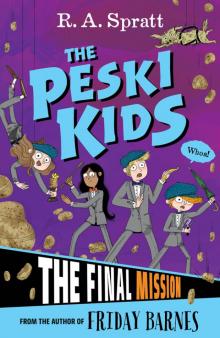 The Final Mission
The Final Mission Stuck in the Mud
Stuck in the Mud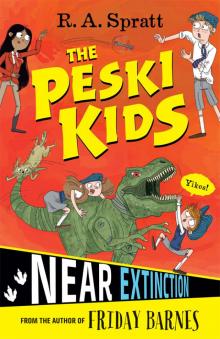 Near Extinction
Near Extinction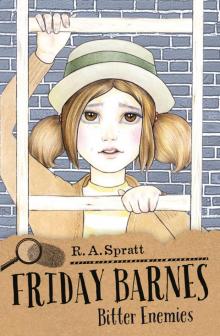 Bitter Enemies
Bitter Enemies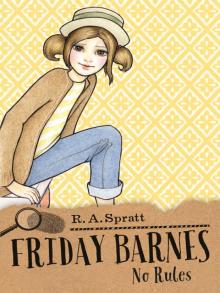 No Rules
No Rules The Mystery of the Squashed Cockroach
The Mystery of the Squashed Cockroach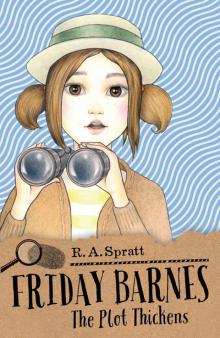 The Plot Thickens
The Plot Thickens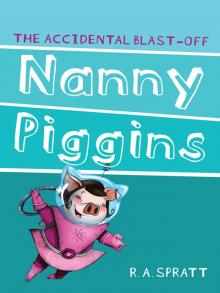 Nanny Piggins and the Accidental Blast-off
Nanny Piggins and the Accidental Blast-off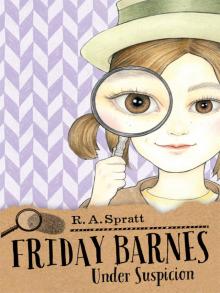 Friday Barnes 2
Friday Barnes 2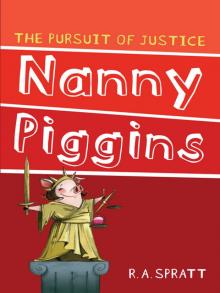 Nanny Piggins and the Pursuit of Justice
Nanny Piggins and the Pursuit of Justice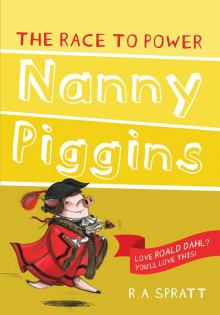 Nanny Piggins and the Race to Power 8
Nanny Piggins and the Race to Power 8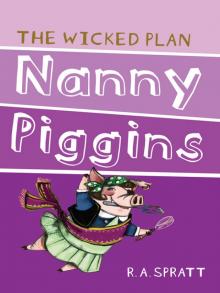 Nanny Piggins and the Wicked Plan
Nanny Piggins and the Wicked Plan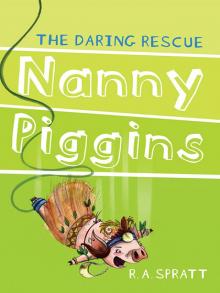 Nanny Piggins and the Daring Rescue 7
Nanny Piggins and the Daring Rescue 7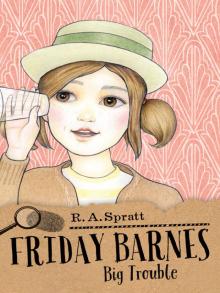 Friday Barnes 3
Friday Barnes 3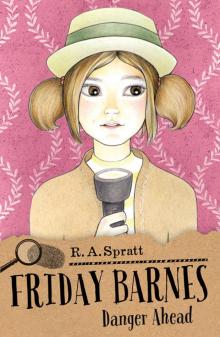 Danger Ahead
Danger Ahead Nanny Piggins and the Runaway Lion
Nanny Piggins and the Runaway Lion The Adventures of Nanny Piggins
The Adventures of Nanny Piggins